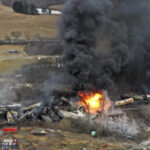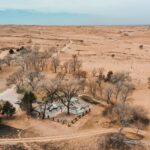A U.S. Geological Survey report concludes the risk of earthquakes for the Dallas-Fort Worth area is higher than it’s ever been.
The USGS report released Monday, according to The Dallas Morning News, incorporates “induced” earthquakes into federal seismic hazard maps. That refers to quakes caused when wastewater from natural gas drilling is injected back into the ground.
The Federal Emergency Management Agency drafted a study of worst-case scenarios for North Texas. The newspaper obtained a study copy through a records request after local and federal agencies initially declined to release it.
A USGS researcher, Robert Williams, says there’s no reason to panic and those scenarios are “unlikely but plausible.” The new report estimates where, how often and how strongly earthquake ground shaking is expected to occur, according to Williams.
“We still believe the earthquake hazard in the Dallas-Fort Worth region is elevated and that people should continue to learn what to do before, during and after an earthquake,” Williams said.
Dallas city officials say they have little data to go on outside of a full year’s worth of quakes and some light tremors dating back to 2008.
The strongest quake to rattle Dallas occurred Jan. 6 with a magnitude of 3.6.
FEMA’s worst-case scenario imagines a major magnitude-5.6 quake, with northwest Dallas, West Dallas and downtown bearing the brunt, according to the USGS ShakeMap included in the FEMA report.
Levees and dams could collapse. About 80,000 buildings would be at least slightly damaged, causing $9.5 billion in “direct economic losses.” Some 290 area bridges would need to be inspected to make sure they didn’t crack or buckle.
A magnitude-4.8 quake would mean significantly less damage, according to the FEMA report. The cost would be an estimated $2.3 billion in Dallas County building losses.
Rocky Vaz, Dallas’ director of emergency management, said that either scenario would have the same result: “You’re talking about massive disruptions and evacuations,” he said. “A nightmare.”
The probability of having a big earthquake – even a 4.6 or 4.8 magnitude – “is very, very low. Less than 1 percent,” Vaz said.
Was this article valuable?
Here are more articles you may enjoy.

 Norfolk Southern to Pay $600 Million to Settle Ohio Spill Case
Norfolk Southern to Pay $600 Million to Settle Ohio Spill Case  Vintage Ferrari Owners’ Favorite Mechanic Charged With Theft, Fraud
Vintage Ferrari Owners’ Favorite Mechanic Charged With Theft, Fraud  Synopsys Sued by Private Equity Firm for Shopping $3 Billion Unit
Synopsys Sued by Private Equity Firm for Shopping $3 Billion Unit  Texas Among Several States Facing New Fire Risks: Weather Watch
Texas Among Several States Facing New Fire Risks: Weather Watch 